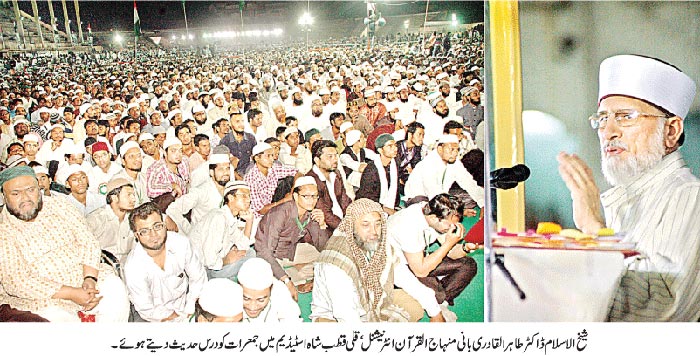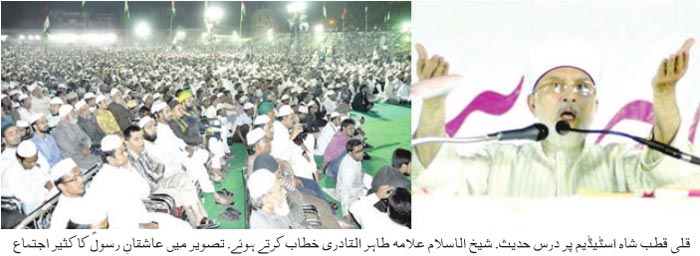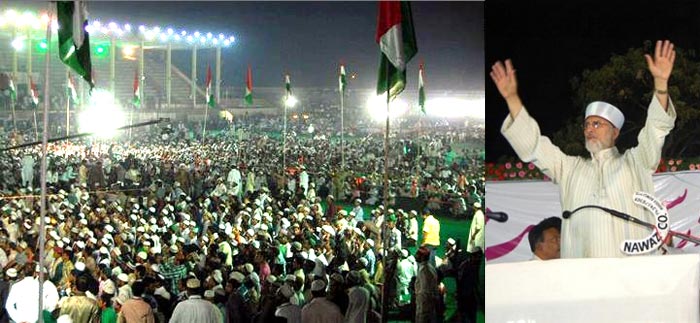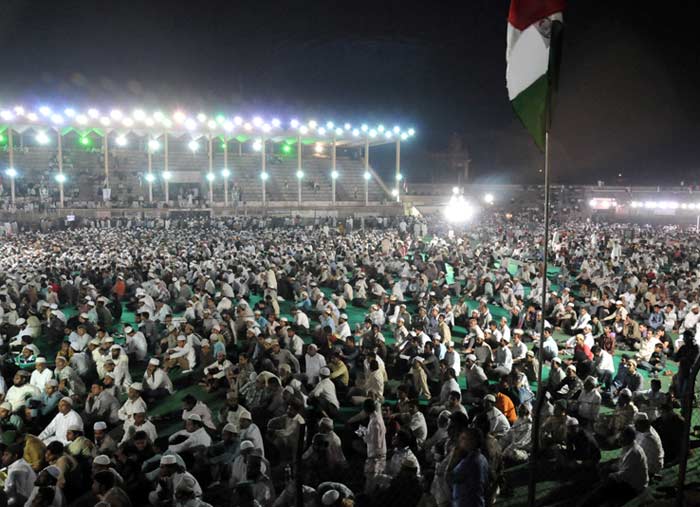
Shaykh-ul-Islam Dr Muhammad Tahir-ul-Qadri, the Founder and Patron-in-Chief of
Minhaj-ul-Quran International, has said that the way seeking help and intercession
of the Holy Prophet (SAW) continued in his blessed life, in the same way seeking
his mediation for forgiveness and expressing one’s want or need at his shrine has
also been an established fact in the lives of the Companions, ‘Tabeen and Taba-Tabeen
and Jurists on Hadith.
Shaykh-ul-Islam expressed these views while addressing the hundreds of religious
scholars on the second day of four-day Hadith session in Quli Qatab Shah Stadium
held under the banner of MQI India. Maulana Syed Kazim Shah Pasha, Sajjada Nasheen of Khanqah-e-Muswia, presided over the programme.
Shaykh-ul-Islam chose some Hadiths on beliefs from ‘Sihah Sitta’. He delivered a continuous speech for well
over three hours and referred to the Holy Quran and Hadith during his lecture.

Shaykh-ul-Islam said that the Holy Prophet (SAW) has himself given an
effective recipe for acceptance of the prayers. Imam Tirmidhi has written that
the prayers need to be made through means of the Holy Prophet (SAW). Other books on Hadith
also mention this aspect. No objection can be raised against this Hadith as
every hadith-scholar has graded it authentic.
Imam Bukhari and other hadith-scholars state that when one is confronted with some want
or a need, one should offer optional prayer and plead one’s case in the court of
the Holy Prophet (SAW). The books on Hadith mention that a blind person made a prayer
in compliance with this command during the period of Hazrat Usman Ghani (RA), his
sight returned immediately. Allama Ibn Taymiyya has supported this Hadith and an agreement
is found among other hadith-scholars on this. This is manifest from this Hadith that
Allama Shawkani, who adheres to ideology of Allama Ibn Taymiyya, has mentioned this Hadith
in ‘Tuhfa al-Dhakireen’. So much so Abdur Rehman Mubarak Puri, a scholar of Ahl-e-Hadees
school of thought, has thrown a detailed light on this Hadith which is spread over
one and half page in his book. It sufficiently makes it clear that there is no disagreement
on this aspect of seeking help and guidance from the Holy Prophet (SAW) during the
initial period of Islam.

Shaykh-ul-Islam Dr Muhammad Tahir-ul-Qadri said that some people believe in the
authenticity of pious actions and regard them as essential for salvation but are
opposed to mediation of the Holy Prophet (SAW) or other saints for that matter.
Thus by rejecting the Prophetic mediation, they are actually opposing the 1300-year
old consensus and tradition. Questioning the reality of the pious actions, he said
that it was with the command of the Holy Prophet (SAW) that any action became a
pious action. In the absence of the approval by the Prophet (SAW), every action
stands rejected. Thus it is through mediation of the Holy Prophet (SAW) that an
action becomes a pious action. It is established from this that anything which deviates
or is contrary to the command of the Holy Prophet (SAW) is an innovation in itself.
Quoting from the books on Hadith, Shaykh-ul-Islam Dr Muhammad Tahir-ul-Qadri
narrated an incident during the reign of Hazrat Usman Ghani (RA). He told that once
a man wanted to meet the Caliph to draw his attention to a pressing issue he was
facing but could not meet for many days. Whenever he would go to meet the Caliph,
the security guard would return him. This man presented his case in the honour of
the Holy Prophet (SAW) after offering optional prayer in accordance with his command.
When he went again to meet the Caliph, the same guard escorted him to the court
of Hazrat Usman (RA) who resolved his problem there and then. He asked him to come
in case he had other problems as he had come with reference to the Holy Prophet
(SAW).

Dr Muhammad Tahir-ul-Qadri
gave reference of verse number 64 from Sura al-Nisa and said
that when people cause harm to themselves, they should present themselves in the honour of the Holy Prophet (SAW) and seek forgiveness from Allah Almighty. If the
Prophet forgave them, they would find Allah Almighty as the Merciful and the One
who accepts their repentance. Shaykh-ul-Islam said that this command was the
order of the day during the Prophetic period and would continue to hold sway
till the Day of Judgment. Imam Abu Abd al-Rahman al-Sulami and Imam Abu al-Qasim
al-Qushayri offered the best interpretation of this verse 1100 years ago. Hafiz
Ibn Kathir, the disciple of Allama Ibn Taymiyya, also interpreted this verse.
Hafiz Ibn Kathir still enjoys
considerable influence in the Arab world. Interpreting the verse, he has written
that Allah Almighty has ordained the sinners from among the Umma of the Holy Prophet
(SAW) that if they committed any sin, they should present themselves in the court
of the Prophet (SAW). This command of presenting themselves holds till the Day of
Judgment.
Dr Muhammad Tahir-ul-Qadri quoted Imam Ahmad bin. Hanbal as saying that Marvan
bin Hakm once saw a man falling on the grave of the Holy Prophet (SAW) and
weeping. He made that person stand up and asked him as to what he was doing as
this was the shrine of the Holy Prophet (SAW). When that person turned his face,
it was known that the man was Abu Ayyub al-Ansari (RA), Companion of the Holy
Prophet (SAW). Abu Ayyub al-Ansari (RA) warned Marvan to be careful in uttering
his words as the former was present in the court of the Holy Prophet (SAW) and
that he had not come to a stone. This action of Abu Ayyub al-Ansari (RA) establishes the principle of this
belief that the Holy Prophet (SAW) is present among us and he who believes to the
contrary happens to deviate from the path of the Companions.
Dr Muhammad Tahir-ul-Qadri narrated the incident of three hadith-scholars that
they remained hungry and thirsty and complained of the same at the shrine of the
Holy Prophet (SAW). They got most delicious food afterwards. They saw that a member
of the Prophet’s family brought food for them. He told them that he brought the
food on the orders of the Holy Prophet (SAW).
Shaykh-ul-Islam narrated the story of Abu Abdullah, Imam of Sheraz. Imam Abu
Abdullah presented himself at the shrine of the Holy Prophet (SAW) along with his
son. His son said that he was hungry. Abu Abdullah then said that they were guests
of the Holy Prophet (SAW). They suddenly fell asleep and when they got up, they
started both laughing and weeping. On inquiry, they told that the Holy Prophet (SAW)
came and handed over money to them. When they awoke, they found the money with them,
which they spent on their travel back to Sheraz from Madina.
Dr Muhammad Tahir-ul-Qadri narrated yet another incident regarding
intermediation through the Holy Prophet (SAW) after his demise from this world. Once the people of Madina
suffered from the worst drought, they came to Hazrat Ayesha (RA), mother of believers
and pleaded their case. She instructed them to go to shrine of the Holy Prophet
(SAW) and that there should be nothing between the sky and shrine. The
Companions dug up a hole in the shrine. It rained so heavily in Madina that the entire city
became inundated with water. The animals drank to their hearts’ fill. It becomes
established from this that intermediation at the shrine of the Holy Prophet
(SAW) is the order of the mother of the believers and there is consensus within
the Companions on it.
After the speech was over, Maulana Syed Qasim Pasha Qadri paid a glowing tribute
to scholarly and intellectual services of Shaykh-ul-Islam Dr Muhammad Tahir-ul-Qadri
and prayed for his long life. Maulana Dr Syed Aleem Ashraf Owaisi extended his full
support on behalf of the Ashrafia family. The distinguished religious scholars who
attended the programme included Maulana Syed Ghous Mohi-ud-Din Qadri, Maulana Qazi
Syed Azam Ali Sufi, Maulana Syed Habib Musawi and others. The arrangements for the
programme were undertaken under the supervision of Muhammad Ghous and Deputy Floor
Leader of Majlis-e-Baldi Party Hyderabad.


